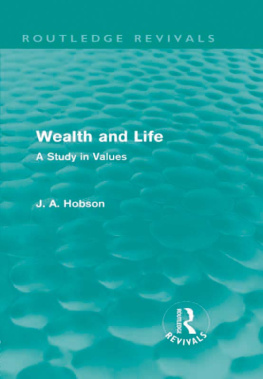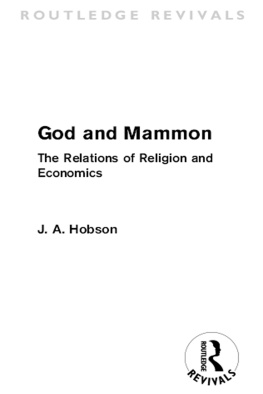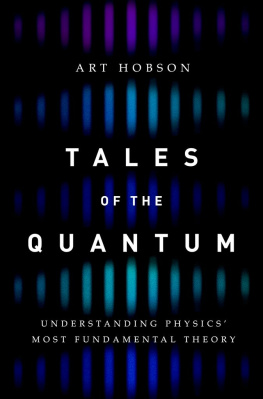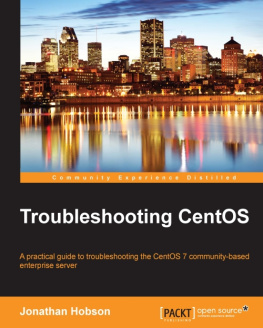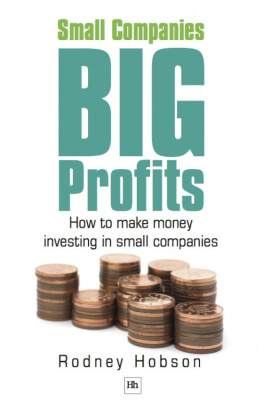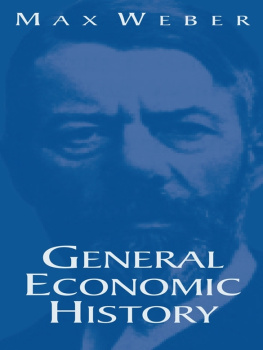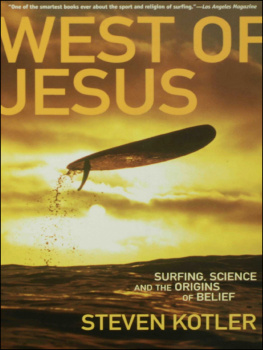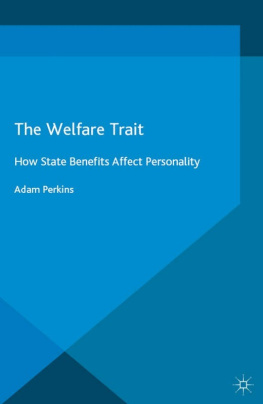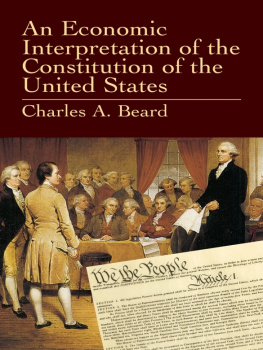Routledge Revivals
Wealth and Life
First published in 1929, this book endeavours to trace and express the relations between economic and human values, between wealth and life. Hobson studies everything from the role of production processes and consumption in the determination of human welfare; to the changing attitudes of economic science towards ethical considerations; as well as the tendency of organised society to exercise a control of economic processes in the interests of equity, humanity, and social order.
is addressed to the notion of industrial peace and progress in the light of modern humanism, with especial regard to the new problems emerging in a world becoming conscious of its widening unity.
Wealth and Life
A Study in Values
J. A. Hobson
First published in 1929
by Macmillan & Co. Ltd
This edition first published in 2012 by Routledge
2 Park Square, Milton Park, Abingdon, Oxon, OX14 4RN
Simultaneously published in the USA and Canada
by Routledge
711 Third Avenue, New York, NY 10017
Routledge is an imprint If the Taylor & Francis Group, an informa business
All rights reserved. No part of this book may be reprinted or reproduced or utilised in any form or by any electronic, mechanical, or other means, now known or hereafter invented, including photocopying and recording, or in any information storage or retrieval system, without permission in writing from the publishers.
Publisher's Note
The publisher has gone to great lengths to ensure the quality of this reprint but points out that some imperfections in the original copies may be apparent.
Disclaimer
The publisher has made every effort to trace copyright holders and welcomes correspondence from those they have been unable to contact.
A Library of Congress record exists under LC Control Number: 30017054
ISBN 13: 978-0-415-52l26-0 (hbk)
ISBN 13: 978-0-203-12194-8 (ebk)
Wealth and Life
A Study in Values
BY
J. A. Hobson
MACMILLAN AND CO., LIMITED
ST. MARTIN'S STREET, LONDON
1930
Norwood Press:
Berwick & Smith Co., Norwood, Mass., U.S.A.
PREFACE
THE endeavour in this book to trace and to express the relations between economic and human values, wealth and life, follows several lines of enquiry. One is concerned with studying the part which processes of production and con-sumption play in the determination of human welfare. Another deals with the changing attitudes adopted by economic science towards the demand that it shall take account of ethical considerations in its structure and method. A third treats the distinctively social aspect of the problem, the tendency of organised society to exercise a control of economic processes in the interests of equity, humanity, and social order.
The threads of these enquiries sometimes run separately, sometimes they are intertwined. In order to minimise confusion, I have made certain rather arbitrary divisions. deals with the crucial issues of industrial peace and progress in the light of modern humanism, with especial regard to the new problems emerging in a world becoming conscious of its widening unity.
The brief Bibliography given in the Appendix is, of course, wholly inadequate as an indication of the vast literature upon which readers might draw in profitable pursuit of the topics discussed here. I thought it well, however, to give prominence to a few works which I have found particularly serviceable in preparing the several chapters.
In conclusion, I desire to express my deep sense of obligation to my friends Maurice Adams, C. Delisle Burns, and R. H. Tawney, who were so kind as to read this work in manuscript and to offer me much serviceable advice in bringing it to completion.
J. A. HOBSON
London
February, 1929.
CONTENTS
INTRODUCTORY
To perform with scientific precision the task of translating economic values into ethical or human values is manifestly impossible. For economic values in their first intent are quantities of money, while ethical or human values are qualities of life. Yet money and the economic operations for which money stands, and which money controls, play so important a part in human life as to compel students of humanity to attempt some orderly adjustment between the two sorts of value, some appreciation of economic valuations in terms of the humanly desirable. In any such attempt it is well at the outset to realise the nature of the difficulties to be overcome, and the limits within which we must work in any humanist evaluation of economic processes. To pass from monetary to vital values involves several distinguishable movements. Money values must first be translated into the concrete saleable things, the goods and services, which prices, or any sort of payment or income, express. These goods must then be resolved into their net costs of production and their net utilities of consumption. By costs we signify, of course, not money costs, for that would be retracing our steps, but the wear and tear and disagreeable exertions incurred in the productive processes. Some of this costly wear and tear is that of human beings, some falls directly upon nature and non-human instruments. But, since the task of replacing the non-human wear and tear falls mainly upon man, we may speak of costs as human costs. I use the term net costs, because in many human productive processes there are elements of enjoyment, or utility, as well as of cost, which should be taken into due account. So likewise with the utility or enjoyment of consumption, there is often a debit account from the pains or injuries of illth, misuse, and excess.
This expression of economic values in subjective costs and utilities does not, however, carry them on to the plane of ethical or human evaluation. For these costs or utilities register actual gains or losses as they operate in the economic system on a valuation based on current desires and estimates, which may not be reliable indices of the desirable. Thus some further adjustment is needed to assess the desired in terms of the desirable. Nor is the process yet complete. Even when we have got so far as thus to resolve monetary wealth into its equivalent in human value, we have not finished our task. For in following our economic path we have ignored the interactions that everywhere and always take place between economic and non-economic functions and activities in the human organism.
Ultimately the goods which are the concrete expression of money values must be evaluated by the total effects which by the terms of their production and consumption they exert upon human personalities and communities regarded as organic wholes.
All these steps are necessary to pass from economic wealth, as rendered by money, to human welfare the ethical test and goal. And all these early steps, as we shall see, are slippery. Magnificent plungers like Ruskin may impose arbitrary meanings upon wealth and illth and bring whole civilisations to a grand assize. But those who rely upon calmer reasoning will have to test each step and make good the footing. It may, indeed, turn out that some of our diffi-culties are in a strict sense insuperable. One or more of these steps may be impassable. The strictly subjective element in personality may baffle all computation of concrete wealth in human welfare. The relations between economic and non-economic factors of welfare may evade observation and record.
To certain of these difficulties inherent in the material of our enquiry I will return a little later. But some characteristics of such an enquiry are attributable to the mentality of the enquirer and his approach towards his subject-matter. A disinterested attitude of mind and a dry light are often claimed as indispensable conditions for scientific study. Now a good deal of misunderstanding will be avoided if, at the outset, we recognise the limits to the attainability of these conditions in such an enquiry as we are here entering. Even the most rigorous of behaviourists finds it difficult to observe and plot out human actions in a perfectly dry light of objectivity. No individual or social psychologist can hope to handle the psyche for his subject-matter, without importing into his handling some of the prepossessions or emotional valuations which have entered his personal experience and helped to mould a mind which is not a merely reasoning apparatus but is suffused with feeling. There are, no doubt, large fields in history or sociology where the ordering and interpretation of facts may be conducted with a high measure of strict objectivity. But when we are concerned with the ethical evaluation of any sphere of current conduct, whether in the field of private morals, in art or literature, in business or in politics, strict disinterestedness becomes impossible, and its claim a foolish pretence. In particular the field for our investigation here is thickly sown with emotional disturbers, reflecting the particular interests, leanings, valuations, and attachments that have come, for the most part unconsciously, to mould the valuations with which the investigator must approach his task. At first sight this may seem a counsel of despair. If every observer sees his subject in the light of his unique private interests and prepossessions, we may get as many different social philosophies as there are members of society. But the fallacy of this judgment is obvious. It ignores the uniformity of human nature, the solid fact that all men, in their constitution of body and mind, and in their natural and spiritual heritage and environment, are much more alike than unlike, though the unlike element is so much more interesting as sometimes to obscure the like. So the subjective character of our investigation will be in the main the common character and not the particular bias of a personal character and expression. This is the valid as-sumption for the possibility of any social science. But it would be idle to ignore the fact that, in the observation and interpretation of the modern life of man in any interesting field, it is essential to make due allowance for the

